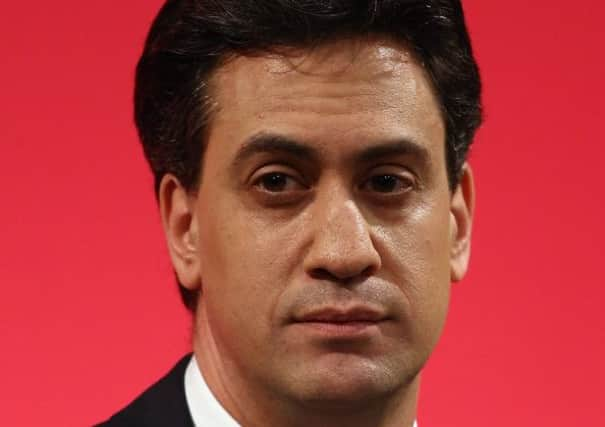Bill Jamieson: MPs’ anti-business mood darkening


Such is the ferocity of exchanges at Westminster now over business malfeasance that it looks less like an engagement between two respected party leaders than an all-out brawl between Bruce Willis and Al Pacino.
But who in business takes this seriously? Many wave all this aside as little more than political knockabout ahead of the election less than three months away.
Advertisement
Hide AdAdvertisement
Hide AdBut that, say others, is just the point. Business – particularly those in the financial sector – find themselves in the firing line at a highly sensitive time. Government critics play on the “dodgy donors” and the anti-tax avoidance/evasion mood to promise tough measures post the election.
As for this angry mood fading away with a return of the long-awaited “feel-good factor”, there is still little sign that voters are experiencing an uplift. Labour enjoys a modest but persistent lead over the Conservatives.
SNP First Minister Nicola Sturgeon has upped the anti-austerity rhetoric, claiming the Westminster government’s long-term economic plan has “failed” and that public spending needs to rise.
Some are already comparing her anti-austerity stance to that of the radical left-wing Syriza party in Greece and Podemos in Spain. Scotland, on this analysis, is part of a growing rebellious mood across Europe for radical political change, outstripping anything that the orthodox socialist parties have to offer.
A scary time for business, then? Time, surely, to duck below the parapet, pull back on marketing, put expansion plans on ice and keep conserving cash while you can?
Well, not at all, to judge by a respected business opinion tracking poll this month.
It finds that businesses in Scotland are unruffled by the prospect of an upcoming election, despite the current high-profile debate around businesses’ confidence in political parties.
According to BDO’s Business Trends report, business optimism and output still remain high despite the most unpredictable election in a generation being only three months away.
Advertisement
Hide AdAdvertisement
Hide AdCompanies’ hiring intentions also remain positive. Its Employment Index, measuring expected employment growth, remains well above its long-term trend, signalling that firms expect businesses to keep hiring in the near term.
BDO’s Martin Gill says: “This month’s report shows that businesses can and will tune out of the parties’ electioneering to focus on what really matters: their business prospects.
“By discounting the political noise and taking a realistic view of the economy’s strengths, businesses are remaining cautiously optimistic.
“Businesses are worried less about the detail of which candidate will get the keys to Number Ten and more about the country’s long-term economic prospects.”
BDO is not alone in these findings. Recent Bank of Scotland reports on private sector employment finds that while there has been a slowdown in the jobs market at the start of the year, the barometer points to a marked improvement in Scotland’s labour market conditions overall.
Last week’s Inflation Report from the Bank of England showed the growth forecast for the coming year has been pushed up. It is now looking for growth of 2.9 per cent this year.
And the Confederation of British Industry has upgraded its growth prediction for 2015 in its latest economic forecast against a backdrop of lower oil prices and inflation.
Job creation continues apace and wage growth is finally picking up. Coupled with low inflation, this, it says, will give a boost to real household incomes, going some way to improving living standards.
Advertisement
Hide AdAdvertisement
Hide AdThe brighter picture for growth this year of 2.7 per cent (from 2.5 per cent expected in November) also reflects the likelihood that the MPC won’t raise interest rates until early next year, helping to support growth of 2.6 per cent in 2016.
So, is it sunny uplands ahead or a gathering storm? A gridlocked parliament, a minority Ed Miliband premiership propped up by an anti-austerity SNP hardly suggests a tranquil time ahead for business.
Nearly all businesses pursue tax avoidance in one form or another – indeed, many of the “loopholes” provided in our complex tax system are reliefs to boost spending on capital equipment and encourage investment in SMEs. Tax evasion, which is illegal, requires legislative clampdown and sanctions, not a wholesale raising of the tax take.
But from where will the money come to finance the extra public spending commitments being promised? An interesting vignette was provided in an interview with the shadow work and pensions secretary Rachel Reeves on Radio 4’s Today programme last week. She announced that a new policy she was promoting would be “paid for by government, not by businesses”. But as Jonathan Isaby of the Taxpayers’ Alliance pointed out, the last time he checked, the government had no source of funds other than the tax which it takes from individuals and businesses – and borrowing doesn’t count because it is only deferred taxation.
As for deficit reduction – such as it is – this is more likely to proceed by way of tax rises than public spending reduction. Some calculate that Nicola Sturgeon’s plans would mean an extra £180 billion of debt piled on to the existing UK total of £1.4 trillion. Even if such plans can be dismissed as an election tactic to outflank Scottish Labour on public spending, it leaves searching questions for the business sector on how the tug-of-war between Labour and the SNP will finally settle – and what tax rates and levels will prevail under “more powers”.
Business may be deluding itself that there is little to be concerned about in the immediate term. The outlook for now remains reasonably benign and a further fall in inflation will work to boost after-tax real household incomes. But it would be dangerously complacent to assume that today’s political rhetoric counts for nothing. «